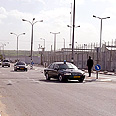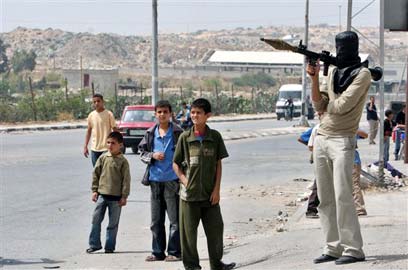
IDF concerned Gaza chaos could spill into Israel
Army says situation in Strip volatile, violence can spill into Israel if economic, security situation does not improve
With the number of Qassam rockets launched from the Gaza Strip into Israel increasing, the security establishment painted a gloomy forecast for the 1.2 million Palestinians living in the tiny coastal territory.
"The situation is extremely delicate and volatile. There is concern that the inner unrest will explode and propel violence toward us," said one security source to Ynet. The greatest concern is that innocent but desperate citizens will do anything for money, including acts of terror.
"Chaos rules the streets, the anticipated improvements after the establishment of the joint Fatah-Hamas government have not materialized. The number of casualties from inner clashes is growing continuously."

Gunman holds RPG rocket as children look on (Photo: AP)
According to the source, there are delays in clearing garbage from the streets, there is no order or law enforcement, and weapons are sold to anyone in plain view at markets.
"Hamas, in their desire to divert attention will carry out attacks, there will be Palestinian casualties, funerals, mass gatherings and the fermenting anger will be directed at Israel. More people will be drawn in that direction because there is no alternative."
In an attempt to alleviate the despair on the Palestinian street, the District Coordination and Liaison Administration at the Erez crossing between Israel and Gaza is making an effort to redirect the citizens away from terrorism.
Colonel Nir Peres, head of the administration explained: "During the last few months, owing to steady activity at the Karni crossing, record quantities of strawberries and flowers have been exported from the Strip. This means that thousands of Palestinians have been working and not looking for an alternative in terrorism."
Promote Palestinian economy
"Our policy is clear," he said, "We are fighting the terrorist organizations, but we are in no way at a war with the Palestinian people. We want to give the citizens the means to develop the Palestinian economy, by operating the crossings and coordinating all of the organizations that handle the matter."
Peres expects positive results several months after the implementation of the policy. Over the last few months there has been an obvious increase in the quantities of raw materials entering the Strip and in the amount of furniture, textile and other products coming out from there.
The security establishment believes that a 2.2 percent decline in Palestinian unemployment has even influenced the scope of Qassam launchers.
"I am not naïve," he stated. "It is obvious that this will not stop terrorism in the Strip, but it reduces the despair among thousands of Palestinians who now have a livelihood and a direction in life. Otherwise, it is clear that some of them would have chosen to launch Qassam rockets for a nice sum from the terrorist organizations."
'They understand that we are not against them'
The administration rejected Palestinian claims that there is a humanitarian crisis in the Strip as a result of Israel's actions. "After the disengagement, there is a Palestinian Authority which is the responsible body. We do not determine the quantities of goods that are imported or exported, and we do not involve ourselves in internal matters," he said.
"Occasionally, due to security considerations, when there are attempted attacks at the crossings – and there have been quite a few terrorist attacks at the border crossings between Israel and the Gaza Strip – we close them temporarily," explained Col. Peres.
At a recent High Court of Justice session regarding a petition filed by several organizations against the security establishment, Col. Peres claimed that January 2007 saw a 72 percent increase in imports into the Strip compared to the same time in 2006 and that exports had increased by 24 percent.
The High Court of Justice rejected the petition. The judges asserted that the security establishment was doing everything possible to keep the border crossing open regularly.
Peres noted that his statements were recently published in one of the larger newspapers in the Strip.
"There is a feeling that they understand that we are not against them," he said.
"At the end of the day they need to choose whether they want to work in Ashdod or Ashkelon or whether they want to launch rockets at them; to live and work and develop the economy or develop terrorism that brings despair and death."










